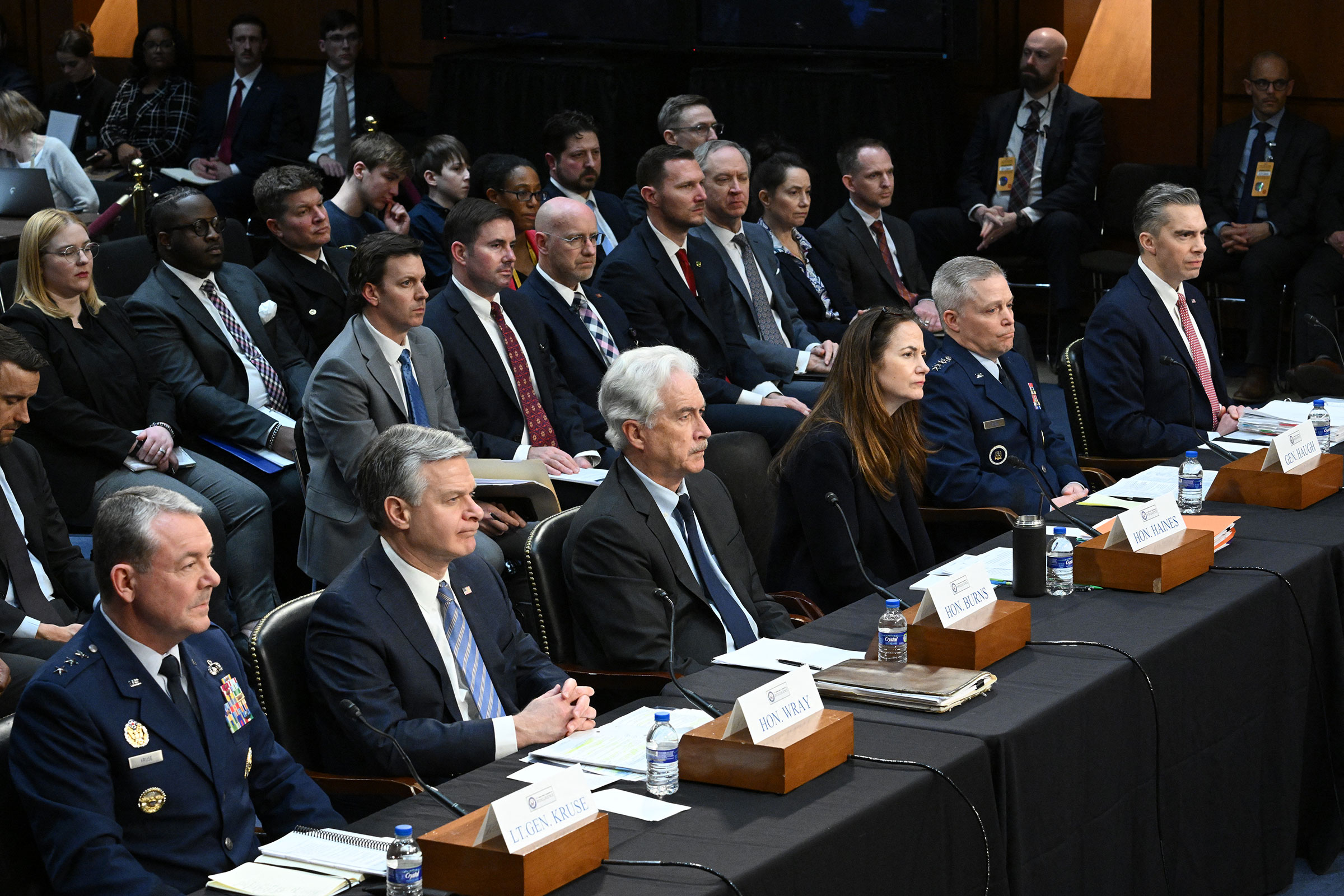World News – 2024 – Video Playlist | Video Playlists | Sites: | newsandtimes.org | links-newsandtimes.com | worldwebtimes.com | southcaucasusnews.com | russianworld.net | jossica.com | octobersurprise2016.org | bklyntimes.com | oceanavenuenews.com | fbireform.com | bloggersunite.net | octobersurprise-2024.org | Trump-News.org | Audio-Posts.com | Bklyn-NY.com | Posts Review – newsandtimes.org | Capitol-Riot.com |
The News And Times Review – NewsAndTimes.org

U.S. intelligence leaders warned Monday that the country faces an “increasingly fragile world order” as it navigates a range of global threats exacerbated by adversaries’ use of emerging technologies like AI.
“The threat of malign actors exploiting these tools and technology to undercut U.S. interests and democracy is particularly potent as voters go to the polls in more than 60 elections around the globe this year,” Director of National Intelligence Avril Haines told the Senate Intelligence Committee at its annual hearing on the top threats to the nation.
U.S. intelligence agencies are focused on China’s efforts to manipulate the 2024 presidential election and the potential for bad actors to use AI tools to create and amplify disinformation campaigns. The U.S. is facing “an ambitious but anxious China, a confrontational Russia, some regional powers such as Iran, and more capable non-state actors [who] are challenging longstanding rules of the international system as well as U.S. primacy within it,” the intelligence community said in its new 40-page unclassified report on worldwide threats.
Read More: Why Spy Agencies May Lose Sweeping Surveillance Powers.
The hearing represents an annual opportunity for lawmakers to publicly question the country’s top intelligence chiefs. In addition to Haines, CIA Director William Burns, FBI Director Christopher Wray, State Assistant Secretary of State for Intelligence and Research Brett Holmgren, National Security Agency Director Gen. Timothy Haugh, and the head of the Pentagon’s Defense Intelligence Agency, Lt. Gen Jeffrey Kruse, appeared before the Senate panel. Here are some of the threats covered in the hearing and report.
China may target the 2024 U.S. elections
Intelligence officials assess that China “may attempt to influence the U.S. elections in 2024 at some level because of its desire to sideline critics of China and magnify US societal divisions,” according to the report.
Under President Xi Jinping, “Chinese leaders believe it is essential to project power globally in order to be able to resist U.S. pressure,” Haines said. But she also noted that Xi’s focus on boosting China’s economy may temper any election interference, which would jeopardize the relationship with the U.S. and potentially damage China’s ability to attract foreign investment.
TikTok under fire
Lawmakers from both parties raised concerns about the popular social-media app, which is mentioned briefly in the intelligence report. “It uses the data of Americans to basically read your mind and predict what videos you want to see,” Republican Senator Marco Rubio of Florida said. “The problem is the algorithm that powers it is controlled by a company in China that must do whatever the Chinese Communist Party tells them to do.”
In the report, U.S. spy chiefs note that China is “demonstrating a higher degree of sophistication in its influence activity, including experimenting with generative Al.” TikTok accounts run by a Chinese propaganda arm reportedly targeted both Democrat and Republican candidates from during the 2022 U.S. midterm elections.
There is bipartisan agreement that the video-sharing app, which is owned by Chinese company ByteDance, poses a national security threat. A bill that would require the company to divest from the massively popular platform, which has about 170 million U.S. users, or face a ban is expected to come to a vote in the House of Representatives this week. It would require ByteDance to sell TikTok within six months or be banned from Apple, Google, and other U.S. app stores and web-hosting services. The measure was sponsored by Republicans, but has significant bipartisan supportCK. President Joe Biden, whose campaign recently created its own TIkTok account, has told reporters: “If they pass it, I’ll sign it.”
“High” risk of escalation in the Middle East
The war in Gaza and the resulting humanitarian crisis has galvanized Arab countries in the region, where there is rising “public sentiment against Israel and the United States for the death and destruction,” U.S. intelligence officials say in their report.
“While it is too early to tell, it is likely that the Gaza conflict will have a generational impact on terrorism,” Haines told lawmakers at the hearing, which was repeatedly interrupted by anti-war protestors. Inspired by Hamas, terrorist groups including al Qaeda and ISIS have directed supporters to conduct attacks against Israeli and American interests as the war drags on, Haines said.
Read More: Inside the Israel-Hamas Information War.
While the report states that the U.S. intelligence community assesses that “Iranian leaders did not orchestrate nor had foreknowledge” of Hamas’ Oct. 7 assault on Israel, attacks by Iranian-backed groups are threatening to destabilize Lebanon, Iraq, the Gulf, and the Red Sea. “The risk of escalation into direct interstate conflict, intended or otherwise, remains high,” the intelligence report says.
U.S. support for Ukraine is critical
As the war in Ukraine enters its third year, U.S. intelligence chiefs emphasized the importance of continued U.S. military support. “The Ukrainians are not running out of courage and tenacity, they’re running out of ammunition,” Burns told lawmakers. “And we’re running out of time to help them.”
If the U.S. is seen as walking away from support for Ukraine, “not only is that going to feed doubts amongst our allies and partners in the Indo-Pacific, it’s going to stoke the ambition of Chinese leadership,” the U.S. spy chief said.
Intelligence leaders noted the challenge posed by Russia’s strengthening ties with China, Iran, and North Korea, which they said was bolstering its defense production and economy. “Putin’s strategic goals remain unchanged,” Haines told the Senate panel. “He continues to see NATO enlargement and Western support for Ukraine as reinforcing his long-held belief that the United States and Europe seek to restrict Russian power and undermine him.”
Read More: Russia’s ‘Space-Based Weapon’ Raises Fresh Fears About an Old Threat
Intelligence chiefs also warned that Moscow could “put at risk long-standing global norms in the use of asymmetric or strategically destabilizing weapons, including in space and in the cyber domain.” Last month, the White House said that Russia was pursuing a “space-based” anti-satellite capability that poses a serious national security concern.

